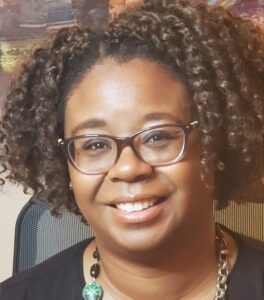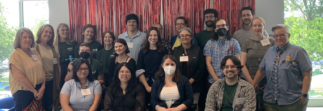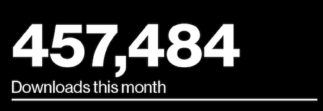 In October, the Libraries welcomed Alexia Hudson-Ward as the new associate director for Research and Learning. Previously the Azariah Smith Root Director of Libraries at Oberlin College, Hudson-Ward provides strategic leadership for the community-facing service portfolio of the Libraries. She recently talked to Bibliotech about the MIT Libraries’ vision, working through a pandemic, what “mind and hand” can mean for libraries.
In October, the Libraries welcomed Alexia Hudson-Ward as the new associate director for Research and Learning. Previously the Azariah Smith Root Director of Libraries at Oberlin College, Hudson-Ward provides strategic leadership for the community-facing service portfolio of the Libraries. She recently talked to Bibliotech about the MIT Libraries’ vision, working through a pandemic, what “mind and hand” can mean for libraries.
Can you talk about some of the aspects of the Libraries vision that you find most compelling?
So much of what we are doing to operationalize the vision is super compelling, specifically, looking at our vision and mission in the era of COVID-19. I think we will emerge from the COVID crisis as fundamentally different people and as a fundamentally different library. One of the many reasons why I was thrilled to join the MIT Libraries at this time in history is that there is no better place in the world, in my mind, to deal with the big issues that we are confronting in relation to this global health crisis. COVID has brought with it different dimensions to how we think about locations, our ever-evolving service model, the exciting elements around the Hayden Library renovation, and defining community more broadly than we did prior to the crisis. All of this connects perfectly to things that I’m deeply committed to, along with a real focus on equity, diversity, inclusion, and social justice (EDISJ). It’s been wonderful to hear and learn that there is such a deep commitment to EDISJ throughout the entire Libraries. It’s been refreshing to know that everyone’s thinking about it outside the traditional corridors that these conversations take us through. Folks are having conversations around neurodiversity, we are thinking about the ways in which the future of work and AI will align within our organizational structure, and we have a commitment to dealing with disinformation as a diversity topic. There are so many pieces to this important pie, and it’s delightful to hear people thinking about it in a multidimensional way.
It’s hard enough starting a new job; you’ve had to do it in the midst of a pandemic. What do you think we can take forward from this experience post-COVID?
Without a doubt, we have all these convergent crises happening in the U.S., and those crises led to my coming to the MIT Libraries. It’s been fraught with challenges, but it’s also been really delightful. Individuals in and outside the Libraries have gone above and beyond to make me feel welcome. That has been heartwarming, and that’s some of what I see continuing post-COVID. I also see our ability to be agile as an organization continuing; activities, processes, procedures, and dialogues that would usually take an exceptional amount of time are getting done more quickly. When I look at the great work that has happened with the on-campus services restart, the Hayden renovation, and its service design—staff pulled all those activities together and integrated me as if I had been here all along. We understand now that we can quickly organize, deploy, and get done the things that are central to the mission and the vision of the Libraries in a far more rapid pace than prior to the pandemic.
You’ve talked about your interest in “balancing a computational future and haptic traditions” in libraries. What does that mean to you?
I was very attracted to the motto of the Institute, “mind and hand,” and I think about the ways in which libraries have always represented that. After all, at one time in history, the book was considered new technology. One of the things I’ve learned in my career is that you can balance a computational present and future with a connection to the haptic. There is a lot of interesting dialogue, from a neurodiversity standpoint, around the differences between reading material electronically versus in print. We can have different types of learning labs that allow for creativity by mind and by hand. For me, that’s a way to wed our “digital first” vision with the ways in which we know people learn by touch, and the MIT Libraries is the best place to explore those dimensions.
You shared that you’re a Formula 1 racing fan. Have you found any fellow fans on the Libraries staff, and what are some of your other passions?
Yes! When I said that, people started popping up on Slack, like “did you see that race this weekend?” I had no idea we had so many race enthusiasts within the Libraries! I also have a passion for eating and cooking; having Slack channels dedicated to these topics has been fun and has helped to foster community for me as I come on board remotely.


